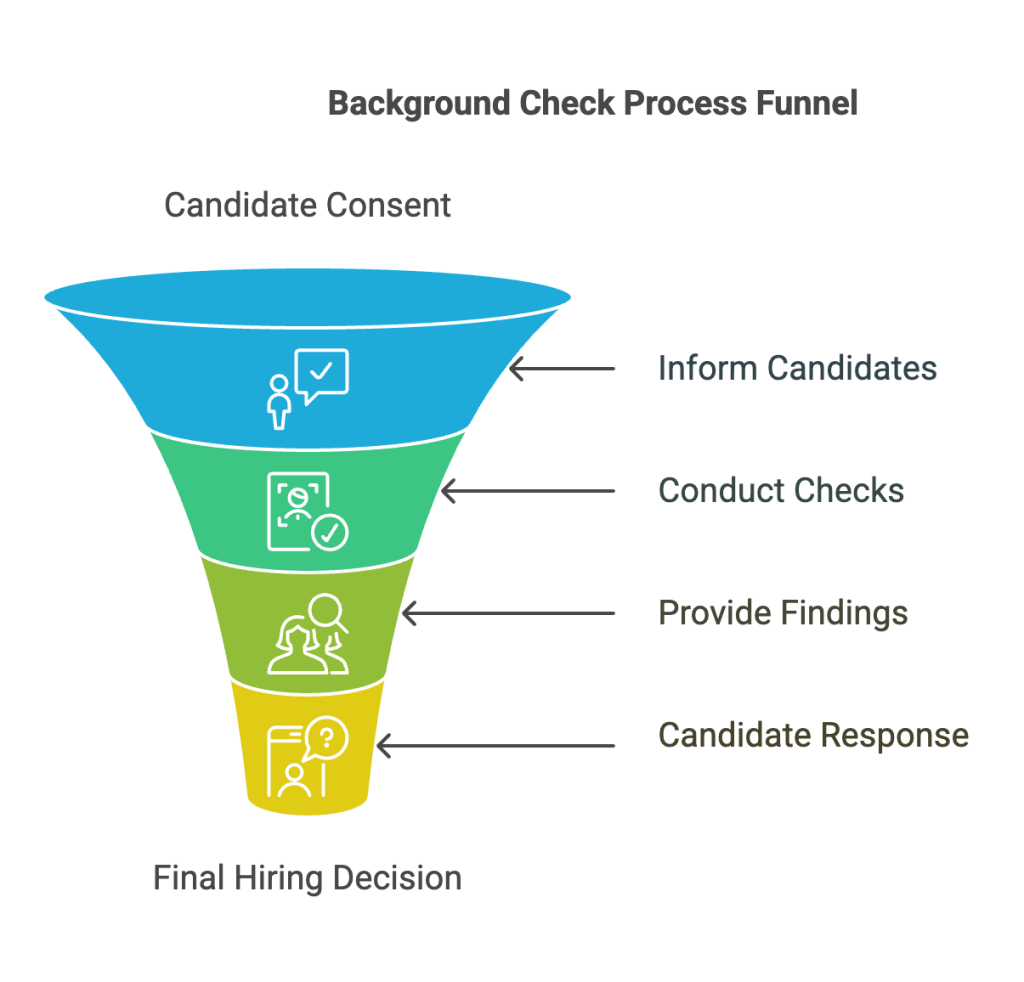Navigating the complex landscape of background checks is a critical component of the hiring process, especially in a bustling state like New York. Whether you're an HR professional striving to ensure legal compliance or a job applicant curious about what goes on behind the scenes, understanding the nuances of New York HR Background Check Compliance is essential.
In this detailed guide, we'll explore the regulatory environment, highlight best practices, and clarify the responsibilities of both employers and candidates. With this knowledge, you'll be well-equipped to approach the hiring process with confidence and clarity.
Key Takeaways
- Understanding New York’s specific regulations helps ensure your background checks meet legal standards and respect candidates' rights.
- Obtaining candidates' consent before conducting background checks is legally required and builds trust upfront.
- Conduct checks after a conditional job offer to comply with the Fair Chance Act and consider any relevant findings openly with the candidate.
- Regular training and using compliant third-party services can enhance your HR team's ability to conduct fair and accurate background checks.
- As a job seeker, be aware of the rights you have to dispute inaccuracies in your background check to protect your job prospects.
Introduction
Background checks are an essential part of hiring. In a state like New York, with its diverse job market, they carry particular weight. Employers use these checks to verify that applicants are who they say they are and to ensure a safe and compliant workplace.
The compliance process in New York is more than a checkbox task. It plays a crucial role in maintaining fair hiring practices. It ensures that both employers and job seekers operate within the bounds of the law, promoting integrity on both sides.
This guide will walk you through New York HR Background Check Compliance. You'll learn about the regulations and best practices that should guide your actions. By understanding these key areas, you'll be better prepared to approach background checks with the knowledge that your practices align with legal and ethical standards.
Legal Framework for Background Checks in New York
Understanding the legal landscape for background checks in New York requires distinguishing between federal and state regulations. At the federal level, the Fair Credit Reporting Act (FCRA) governs how employers conduct, use, and disclose the results of background checks. The FCRA demands candidate consent before a check is initiated and mandates disclosure if the results impact hiring decisions negatively.
New York adds another layer with its specific laws impacting the use of background checks. Article 23-A of the New York Correction Law is crucial here. It prohibits employers from unfairly discriminating against individuals with criminal convictions and requires them to consider factors such as the nature of the conviction, its relevance to the job, and the time elapsed since the conviction. This law aims to ensure a fair chance for those with past infractions to rebuild their lives through employment.
Another significant regulation is New York City's Fair Chance Act, which enforces the "Ban the Box" initiative. This law mandates that employers cannot inquire about criminal history until after a conditional offer is extended. This helps prevent early-stage discrimination based on criminal records, attempting to level the playing field for all applicants.
The New York Department of Labor also provides broader context on hiring practices and compliance. It's wise to frequently check their guidelines to stay informed about your responsibilities under both existing and emerging laws. Understanding these layers of regulation is foundational to creating a compliant, fair hiring process that respects both the legal rights of candidates and the operational needs of businesses. Are you fully equipped to align your practices with these regulations, or should you revisit your policy manual?
Steps in the Background Check Process
Conducting background checks involves several key steps, and preparing adequately is crucial. Start by obtaining clear written consent from the candidate. This not only fulfills legal requirements but also establishes transparency. New York requires that you notify candidates upfront about the checks you intend to conduct.

When it comes to the types of checks available, your options are diverse. Criminal history checks are standard—focus on verifying any past convictions that might impact job performance. Credit reports can offer insight, particularly for positions handling finances. Don't overlook employment and education verification to confirm an applicant's stated experiences and qualifications.
Timing is essential. In New York, background checks usually occur after a conditional job offer has been extended. This timing aligns with regulations like the Fair Chance Act, designed to prevent early-stage discrimination. Informing candidates about the process and any potential findings is critical. If an issue arises during a check, give the applicant a chance to explain or dispute the findings before making a final hiring decision.
Clear communication and adherence to these steps will streamline the background check process, ensuring it’s both legal and respectful. As you engage with candidates, consider how these processes impact both parties involved—it's not just about finding the best hire, but doing so with fairness and legality in mind.
Best Practices for HR Professionals
Navigating New York's background check regulations can feel overwhelming. But with the right strategies, you can ensure compliance and make informed hiring decisions.
First things first, keep your team informed. Regular training and updates on New York HR laws are essential. Laws can change, and staying updated minimizes risks. For instance, familiarize your team with Article 23-A, which guides how criminal records should be considered in hiring.
Third-party providers can simplify background checks but choose wisely. Ensure that any service you hire meets federal and state requirements, like those under the Fair Credit Reporting Act. Ask for certifications or past client references to gauge reliability.
Handling adverse findings requires care. If you find something concerning, follow a legal process. Notify the candidate, provide them a chance to discuss the findings, and apply a consistent approach to all cases.
Internally, document your process. Have clear, written policies about how you conduct background checks. Consistent procedures help your team handle checks uniformly and fairly.
Effective practices mean more than compliance—they build trust with candidates. When candidates know your processes are fair, they’re more likely to be engaged and open during the hiring process.
Candidate Perspective: What Job Seekers Should Know
If you're a job seeker in New York, understanding your rights during the background check process is key. New York law requires that employers obtain your consent before conducting a background check. You should receive both notification and a summary of your rights under the Fair Credit Reporting Act before any screening begins. This transparency is designed to ensure you are aware of what information might be searched and how it can affect your job prospects.
In the event that you find inaccuracies in your background check, New York law allows you to dispute these errors. Whether it's a mistaken criminal record or incorrect employment history, you have the right to challenge the findings. Contacting the consumer reporting agency directly is usually the best first step, and they are obligated to investigate the dispute within thirty days.
The outcome of a background check can heavily influence hiring decisions. Be proactive; during interviews, discuss any potential red flags that could appear in your report. By being upfront about past issues and providing context, you can steer the conversation toward your qualifications and potential. It's all about presenting a complete and honest picture to prospective employers.
As you embark on the job hunt, keep these steps in mind to safeguard your rights and enhance your chances of securing the role you desire. How prepared are you to address these aspects if they arise during your job search?
Common Challenges and How to Overcome Them
Background checks can create several challenges for employers, especially in New York's intricate legal environment. Understanding these challenges helps minimize risks and ensures a smoother hiring process.
Data Privacy Concerns
Protecting personal data is a top priority. You must comply with data privacy laws, such as the General Data Protection Regulation (GDPR) if dealing with international candidates, and locally, the New York SHIELD Act. Always obtain clear consent from candidates before collecting any personal information. Implement secure data storage solutions to prevent breaches. Regular audits of your data management processes can help in maintaining compliance.
Balancing Transparency and Confidentiality
Strive for clarity with your applicants about what information will be collected and how it will be used. Yet, ensure confidentiality regarding sensitive data. Equip your team with guidelines on the confidentiality of candidate data, sharing only what’s necessary and maintaining discretion in communications. Remember, a candidate’s trust hinges on your ability to protect their privacy while being forthright about the process.
Keeping Up with Legal Changes
New York is known for its evolving employment laws. Stay informed about legal updates through continuous education and subscribing to relevant legal briefings. Consider joining professional HR organizations or hiring legal experts to guide your compliance strategies. Regular training sessions for your team will help everyone stay on track with legal shifts, reducing the likelihood of costly mistakes or non-compliance.
These strategies will not only streamline your background check processes but also build a transparent and trustworthy rapport with potential hires. Are your current practices aligned with these essentials? If not, it might be time for a compliance check-up.
Conclusion
Navigating background check compliance is a journey of understanding rights, responsibilities, and regulations. Remember the diverse mix of federal and state laws, like New York’s Article 23-A and the Fair Chance Act. These create a framework that both protects candidates and guides employers. Stay vigilant about updates to maintain compliance and prevent legal issues.
HR professionals must focus on rigorous strategy implementation. This starts with proper pre-check preparations and extends to delivering consistent internal training. Using compliant third-party services can further assure accurate checks and confidentiality. Being proactive in handling adverse findings will help in making lawful decisions that align with your organizational values.
For candidates, knowing your rights equips you with the ability to challenge potential inaccuracies and helps you present your best during interviews despite any red flags. Understanding how background checks influence decisions can assist you in mitigating any negative impacts in advance.
Ultimately, the goal is to move towards a transparent, equitable hiring process. Compliance is not merely a requirement—it's an opportunity to build trust in the recruiting journey. Access additional resources to stay informed and enhance your approach to background checks in New York.
Frequently Asked Questions (FAQs)
What is the background check policy in New York?
In New York, background checks are regulated to ensure privacy and fairness. Employers must obtain your written consent before conducting a background check as part of the hiring process.
How far back does a background check go for employment in New York?
In New York, criminal convictions can be reported indefinitely, but consumer reporting agencies can only report non-conviction information that is up to seven years old.
What is a level 2 background check in New York?
A level 2 background check typically includes criminal history, employment verification, and education verification. It is used for positions that involve a higher level of responsibility.
How to get a New York state criminal background check?
You can obtain a New York state criminal background check by submitting your fingerprints to the New York State Division of Criminal Justice Services. This can be done electronically through authorized vendors.
What does a New York background check show?
A New York background check may show criminal records, employment history, education verification, and sometimes credit history, depending on the job requirements.
Can an employer in New York ask about your salary history?
No, it is illegal for employers in New York to request or rely on your salary history when determining your salary offer during the hiring process.
Does New York allow the use of credit checks for employment?
In most cases, employers in New York City cannot use credit checks in hiring decisions for most positions due to local laws protecting against discrimination based on credit history.
Is there an expungement process for criminal records in New York?
Yes, New York allows for certain convictions to be sealed or expunged under specific conditions, often involving meeting certain court requirements and demonstrating rehabilitation.
How does New York protect against discrimination in hiring based on criminal history?
New York provides protection through the Fair Chance Act, which prohibits employers from inquiring about your criminal history until after a conditional job offer is made.
Definitions
- Background Checks - A process employers use to verify a candidate’s identity, employment history, education, criminal record, and sometimes credit history. These checks help confirm qualifications and assess any potential risks before hiring.
- Compliance - Following legal and regulatory requirements in hiring practices, including background checks. Employers must adhere to federal laws like the Fair Credit Reporting Act (FCRA) and state regulations like New York’s Article 23-A to ensure fair treatment of applicants.
- Fair Chance Act - A New York City law that prevents employers from asking about an applicant’s criminal history until after making a conditional job offer. This law helps individuals with past convictions have a fair opportunity to compete for jobs.
- Article 23-A - A New York law that restricts discrimination against job candidates with criminal records. Employers must evaluate the nature of the conviction, its relevance to the job, and the time that has passed before making hiring decisions.
- Candidate Consent - A required step before conducting a background check. Employers must inform candidates in writing and obtain their written permission before proceeding. This ensures transparency and allows applicants to understand how their information will be used.

GCheck Editorial Team
Meet the GCheck Editorial Team, your trusted source for insightful and up-to-date information in the world of employment background checks. Committed to delivering the latest trends, best practices, and industry insights, our team is dedicated to keeping you informed.
With a passion for ensuring accuracy, compliance, and efficiency in background screening, we are your go-to experts in the field. Stay tuned for our comprehensive articles, guides, and analysis, designed to empower businesses and individuals with the knowledge they need to make informed decisions.
At GCheck, we're here to guide you through the complexities of background checks, every step of the way.





